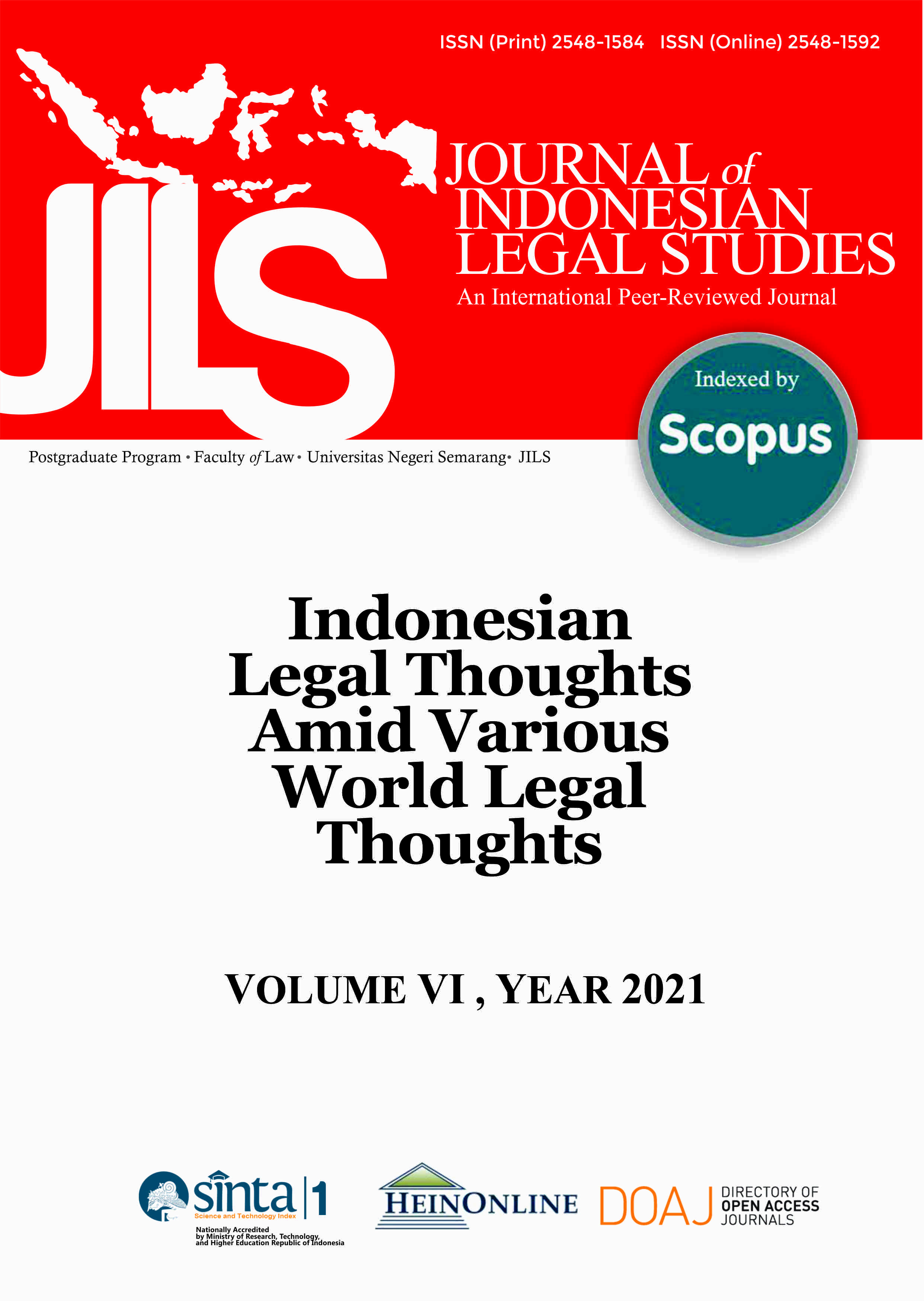Elimination of Sexual Violence in Feminist Legal Theory
Main Article Content
Abstract
The closeness of women to poverty shows that development still maintains women's subordination and places women in a marginal position. What is the analysis of the Feminist Legal Theorist (FLT) in the elimination of sexual violence? Feminist Legal Theory (FLT) as one of the streams in Philosophy of Law is one of the schools of thought that was born from the main philosophy of the paradigm of Critical Theory Feminist Legal Theory (FLT) as one of the streams in the paradigm of critical theory. It is used to analyze the complexity of the needs of victims, both women, girls, boys, and girls. The Bill on the Elimination of Sexual Violence uses the Feminist Legal Theory (FLT) as an analysis so that in every norm that is formulated this bill always considers what specific experiences of women, especially victims of sexual violence. Legal protection against the elimination of sexual violence is a form of implementation of the second principle of Pancasila, namely a just and civilized humanity.
Article Details

This work is licensed under a Creative Commons Attribution-ShareAlike 4.0 International License.
All writings published in this journal are personal views of the authors and do not represent the views of this journal and the author's affiliated institutions. Author(s) retain copyrights under the licence of Creative Commons Attribution-ShareAlike 4.0 International (CC BY-SA 4.0).
References
Bangun, B. H. (2020). Hak Perempuan dan Kesetaraan Gender dalam Perspektif Filsafat Hukum. Pandecta Research Law Journal, 15(1), 74–82. https://doi.org/10.15294/pandecta.v15i1.23895
Clifford, B. A., Indiarti, E., & Sularto, R. (2016). Telaah Paradigmatik Tentang Penerapan Diskresi Pada Pertimbangan dan Putusan Hakim Dalam Perkara Pidana Dengan Terdakwa Labora Sitorus. Diponegoro Law Review, 5(2), 1–16. https://ejournal3.undip.ac.id/index.php/dlr/article/view/11313
Hartanto, R. V. permata, Sulistiyono, A., & Isharyanto, I. (2019). Feminist Perspective towards the Legal Theory on Fisher-Women’s Legal Entity. Fiat Justisia: Jurnal Ilmu Hukum, 13(4), 345–360. https://doi.org/10.25041/fiatjustisia.v13no4.1737
Hidayati, N. (2018). Teori Feminisme: Sejarah, Perkembangan dan Relevansinya dengan Kajian Keislaman Kontemporer. Jurnal Harkat, 14(1), 21–29. https://doi.org/10.15408/harkat.v14i1.10403
Dwiprigitaningtias, I., & Rahmatiar, Y. (2020). Perempuan dan Kekuasaan Dihubungkan dengan Feminist Legal Theory. Justisi Jurnal Ilmu Hukum, 5(1), 54–68. https://doi.org/10.36805/jjih.v5i1.1270
Indarti, E. (2018). Progressive Law Revealed: A Legal Philosophical Overview. Diponegoro Law Review, 3(1), 28–42. https://doi.org/10.14710/dilrev.3.1.2018.28-42
Indiarti, E. (2016). Profesionalisme Pengemban Fungsi Utama Kepolisian dalam Penegakan Hukum di Polda Jawa Tengah. Jurnal Masalah-Masalah Hukum, 43(3), 348–355. http://dx.doi.org/10.14710/mmh.43.3.2014.348-355
Indiarti, E. (2019a). Filsafat Ilmu: Suatu Kajian Paradigmatik. Semarang: Badan Penerbit UNDIP.
Indiarti, E. (2019b). Pancasila dan Pembaharuan Hukum: Suatu Telaah Paradigmatik. National Seminar MIH UNDIP, 1–13.
Komisi Nasional Perempuan. (2021). Perempuan Dalam Himpitan Pandemi: Lonjakan Kekerasan Seksual, Kekerasan Siber, Perkawinan Anak, dan Keterbatasan Penanganan di Tengah Covid-19. Jakarta: Komnas Perempuan. Retrieved from https://komnasperempuan.go.id/uploadedFiles/1466.1614933645.pdf
Lapian, L. G. (2019). Disiplin Hukum yang Mewujudkan Kesetaraan dan Keadilan Gender. Jakarta: Yayasan Obor Indonesia.
Mar’iyah, C. (2012). Demokrasi dan Pembangunan Untuk Siapa: Dapatkan Perempuan Bertahan di Desa atau Menjadi Buruh Migran di Kota. Jurnal Ilmu Pemerintahan: Pencerahan Untuk Memajukan Pemerintahan, 38(1).
Retnani, S. D. (2017). Feminisme dalam Perkembangan Aliran Pemikiran dan Hukum di Indonesia. Jurnal Ilmu Hukum: ALETHEA, 1(1), 95–109. https://ejournal.uksw.edu/alethea/article/view/2518
Savitri, N. (2008). HAM Perempuan Kritik Teori Hukum Feminis Terhadap KUHP. Bandung: Refika Aditama.
Stutz, C., & Sachs, S. (2016). Facing the Normative Challenges: The Potential of Reflexive Historical Research. Sage Journals, 5(2), 1–25. https://journals.sagepub.com/doi/10.1177/0007650316681989
Sulistyawan, A. Y. (2018). Feminist Legal Theory Dalam Telaah Paradigma: Suatu Pemetaan Filsafat Hukum. Masalah-Masalah Hukum, 47(1), 56–62. http://dx.doi.org/10.14710/mmh.47.1.2018.56-62
Synott, A. (2003). Tubuh Sosial: Simbolisme Diri dan Masyarakat. Jakarta: Jalasutra.
Unger, R. M. (2015). The Critical Legal Studies Movement. Massachusetts: Harvard University Press.
Wirasandi. (2019). Wanita dalam Pendekatan Feminisisme. Journal Ilmiah Rinjani, 7(2), 47–58. https://doi.org/10.12345/jir.v7i2.122
